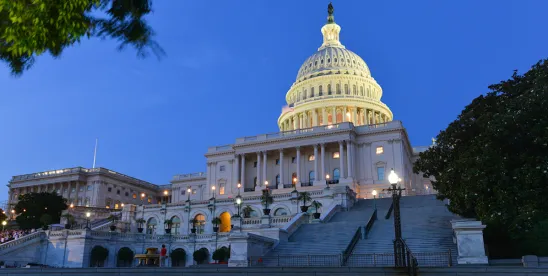When the U.S. House of Representatives and Senate return Sept. 9 for the final “sprint” of the legislative session, Congress will have only three weeks in September, break for elections, and then return for a five-week “lame-duck” session before concluding for the year. This GT Alert provides a snapshot of potential legislative items Congress will consider.
September ‘Must Pass’ Bills
- Continuing Resolution. Funding for federal discretionary programs, which make up roughly one-third of the federal budget, expires Sept. 30. Congress divides discretionary spending into 12 appropriations bills, which must be passed annually. However, since only five of those bills have passed the House and none have yet passed the Senate, Congress will need to pass a short-term funding extension (a continuing resolution, or CR) to buy additional time. House Speaker Mike Johnson (R-LA) has proposed a CR with funding through March 31, 2025, and will add the “SAVE Act,” which would require proof of citizenship for voter registration. The Senate is unlikely to support the March timeline or the voter registration add-on, and will attempt to pass a short-term funding extension that will last into December. Congress will likely spend much of the month debating a compromise. Failure to pass a CR by the end of the month would cause a government shutdown.
- Farm Bill Extension. In November 2023, Congress extended several farm programs through Sept. 30, 2024, after failing to pass a new five-year farm bill. Although the House Agriculture Committee passed a multi-year extension of agriculture and nutrition programs in May (H.R. 8467), Congress has taken no further action. Those expiring programs will need another extension.
- Counter-Drone Program. The Counter Unmanned Aircraft Systems (UAS) program authority for DOJ and DHS expires Oct. 1, 2024. Since Congress is unlikely to have finished a defense authorization bill by then, it would need to grant an extension for these authorities that provide air defenses against drones.
Other Potential September Floor Action
- China Week (House). House Speaker Johnson intends to spend floor time in September debating several China-related bills. These include up to five bills that may be debated subject to a special rule, and more than 20 bills that the House would consider under suspension rules and require a two-thirds vote. The five potential bills subject to amendment are (1) the Protect America’s Innovation and Economic Security from CCP Act (H.R. 1398), (2) the No WHO Pandemic Preparedness Treaty Without Senate Approval Act (H.R. 1425), (3) the DHS Restrictions on Confucius Institutes and Chinese Entities of Concern Act (H.R. 1516),(4) the End Chinese Dominance in Electric Vehicles Act (H.R. 7980), and (5) the Protecting American Agriculture from Foreign Adversaries Act. The 20 or more suspension bills were reported from seven different committees on unanimous or near-unanimous votes. They include the FUTURE Networks Act (H.R. 1513), Export Control Enforcement and Enhancement Act (H.R. 7151), Removing Our Unsecure Technologies to Ensure Reliability and Security (ROUTERS) Act (H.R. 7589), Remote Access Security Act (H.R. 8152), Economic Espionage Prevention Act (H.R. 8361), and the BIOSECURE Act (H.R. 8333).
- Other (House). House Republican leaders have hinted that they may bring legislation to the floor during September relating to other topics, most of which have been reported out of committee. Bills and resolutions that may receive a floor vote include:
| – | H.R. 5339 – RETIRE Act |
| – | H.R. 3724 – Accreditation for College Excellence Act |
| – | H.R. 7909 – Violence Against Women by Illegal Aliens Act |
| – | H.R. 8205 – Keeping Violent Offenders Off Our Streets Act |
| – | H.R. 8790 – Fix Our Forests Act |
- Deepfakes Legislation (Senate). On July 31, Senate Majority Leader Schumer tried unsuccessfully to obtain unanimous consent to pass two bills that restrict the use of artificial intelligence and deepfakes in elections – the Protect Elections from Deceptive AI Act (S. 2770) and the AI Transparency in Elections Act (S. 3875). Sen. Schumer has suggested that he will attempt to attach these bills to the CR in September.
- Railway Safety (Senate). In May 2023, the Senate Commerce Committee passed the Railway Safety Act (S. 576) in response to the 2023 East Palestine, Ohio train derailment on a 16-11 vote. Sen. Schumer has indicated an interest in moving to this legislation, and a procedural vote is possible in September.
Lame-Duck ‘Must Pass’ Bills
- Appropriations / Continuing Resolution. If Congress passes a short-term CR to extend discretionary program funding into December, it must then decide how to act on the 12 regular appropriations bills to fund the government through Sept. 30, 2025, which is the end of the next fiscal year. The outcome of the November elections may impact whether Congress decides to pass full-year legislation or simply pass another CR that extends into 2025 (and the next Administration). In 2023, Congress passed these bills in two packages, with each combining six of the bills. The first package included Agriculture, Commerce-Justice-State, Energy-Water, Interior, Military Construction-VA, and Transportation-HUD. The second package included Defense, Financial Services, Homeland Security, Labor-HHS-Education, Legislative Branch, and State-Foreign Operations. Passage of the bills in this format required bipartisan majorities. Congress may be forced to try a similar approach in December.
- NDAA. Congress has passed an annual defense authorization bill for 63 straight years and is expected to do so again in December. On June 13, the Senate Armed Services Committee reported the National Defense Authorization Act on a 22-3 vote. On June 14, the full House passed the Servicemember Quality of Life Improvement and National Defense Authorization Act (H.R. 8070), 217-199. The inclusion of several social-issue provisions assured a partisan vote in the House. Congress must negotiate several differences between the two bills. Among other things, the Senate legislation authorizes $9 billion more than the House bill. More than 1,100 amendments have been filed in the Senate. House and Senate negotiators will attempt to resolve differences before the bill is brought to the Senate floor during the lame-duck session.
- Health Care Extenders. In March, the Continuing Appropriations Act (H.R. 4366) extended several expiring health care programs through Dec. 31, including funding for Community Health Centers, National Health Service Corps, Teaching Health Centers with Graduate Medical Education, and Special Diabetes programs. It also delayed scheduled cuts for “disproportionate share” hospitals. These provisions are likely to be extended again.
Other ‘Lame-Duck’ Possibilities
- WRDA. Both chambers passed their respective versions of the Water Resources Development Act this summer (H.R. 8812; S. 4367) with strong bipartisan votes, and now will work to resolve differences and enact a comprehensive bill before the end of 2024. The legislation authorizes civil-works projects for ports and harbors, inland waterways, and flood and storm protection.
- Online Safety. In July, the Senate passed the Kids Online Safety and Privacy Act (S. 2073) on a 91-3 vote. The legislation combines elements of two bills that have been debated for years – the Kids Online Safety Act and the Children’s Online Privacy Protection Act (COPPA 2.0). Speaker Johnson has indicated support, saying he is “committed to working to find consensus in the House.”
- Data Privacy. In May, the House Energy and Commerce Subcommittee on Innovation reported comprehensive data privacy legislation, known as the American Privacy Rights Act, by voice vote. It is unclear if the legislation will advance further. The Senate Commerce Committee has failed to reach consensus on similar legislation.
- Artificial Intelligence. In addition to the election-related deepfakes legislation mentioned above, several AI bills have a chance to move during the lame-duck session, either as standalone legislation or as part of the NDAA. On July 23, the full Senate unanimously passed the DEFIANCE Act (S. 3696), which would allow victims of deepfakes to sue. On July 31, the Senate Commerce Committee and the Senate Homeland Security and Governmental Affairs Committee passed several significant bills relating to AI, including the PREPARED for AI Act (S. 4495), CREATE AI Act (S. 2714), TEST AI Act (S. 3162), AI Research, Innovation, and Accountability Act (S. 3312), Promoting U.S. Leadership in Standards Act (S. 3849), Future of AI Innovation Act (S. 4178), NSF AI Education Act (S. 4394), Small Business AI Training and Toolkit Act (S. 4487), AI Public Education and Awareness Act (S. 4596), and Validation and Evaluation for Trustworthy AI Act (S. 4769).
- Permitting Reform. On July 31, the Senate Energy & Natural Resources Committee passed the bipartisan Energy Permitting Reform Act (S. 4753) on a 15-4 vote. The legislation represents a compromise negotiated by Sens. Manchin (I-WV) and Barrasso (R-WY) and would expedite permitting for all types of projects, including oil and gas, coal, renewable energy, and electric transmission.
- Trade. There are several trade-related proposals that could be considered during a lame-duck session. Competing proposals to end the $800 “de minimis” exemption from customs duties as it applies to certain imported goods from China have received much attention. In April, the House Ways and Means Committee reported H.R. 7979 on a party-line vote. Rep. Blumenauer (D-OR) has introduced a competing bill (H.R. 4148), and a bipartisan group of Senators (Wyden, Lummis, Brown, Collins, and Casey) announced on Aug. 8 that they had reached consensus on a compromise approach to the de minimis issue. On the regulation of outbound investments in foreign countries of concern involving key technology sectors, there are competing House bills reported by the Foreign Affairs a Committee (H.R. 6349) and Financial Services Committee (H.R. 760). The House Ways and Means Committee has also reported the Generalized System of Preferences (GSP) Reform Act (H.R. 7986). Some lawmakers also support passing a miscellaneous tariffs bill and reauthorizing trade adjustment assistance programs.
- Stablecoins. In May, the House passed the Financial Innovation and Technology for the 21st Century (FIT-21) Act (H.R. 4763) by a 279-136 vote. The legislation would establish a comprehensive framework for regulating cryptocurrency, including clarifying Securities and Exchange Commission and Commodity Futures Trading Commission (CFTC) jurisdiction. The Senate Agriculture Committee may attempt to mark up its version of the CFTC portion of the legislation during the lame-duck session. In the meantime, the House may also consider narrower legislation to regulate stablecoins known as the Clarity for Payment Stablecoins Act (H.R. 4766). This bill was reported by the House Financial Services Committee last summer. Sens. Lummis (R-WY) and Gillibrand (D-NY) have introduced similar legislation in the Senate (S. 4155).
- China (Senate). The Senate will likely determine which of the House-passed “China Week” bills it will consider during the lame-duck session.
- Nominations (Senate). Twenty-nine judicial nominations and multiple executive branch nominees on the Senate Executive Calendar are awaiting floor consideration, and Majority Leader Schumer can be expected to get as many of these nominees confirmed as possible.
- Debt Limit. The Fiscal Responsibility Act enacted in June 2023 suspended the debt limit until Jan. 2, 2025, at which point it will be reinstated at an amount equal to the outstanding debt at that time. Congress must determine if additional action to address the debt limit is possible in December. The Treasury Department will need to determine how much additional time might be made available by taking “extraordinary measures” to avoid default if Congress fails to act.





 />i
/>i

